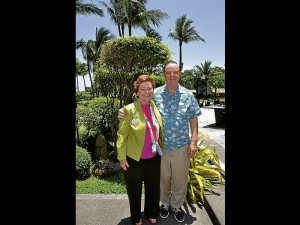Have your check-ups, American biochemist urges Filipinos
What does it take to live a long and healthy life well beyond what statistics would expect?
In a nutshell, these are what the centenarians would advise: Get more exposure to the early morning sun; go to bed well before midnight; avoid animal protein and eat more fresh vegetables, nuts, and fruits; and don’t just sit there and wallow in self-pity, get up, be happy, and move it.
These tips can be found in a number of books on how to live to 100. But when one actually does reach that age, then what? Darlene McCord, Ph.D. has written her own book “Living Well at One Hundred.”
Darlene, along with husband James, was a recent visitor to the Philippines to introduce her supplement line Olivamine.
Her book lists the usual prerequisites to living to a ripe, old age. But she goes further to recommend ultra-senior citizens to subject themselves to regular tests.
McCord, who specializes on trauma wound and skin care, explained in detail what these tests meant, and attempted to answer some difficult questions about the need to take these tests, especially blood tests, and interpreting the results.
Blood tests
McCord stressed that blood tests measure important indicators, such as total cholesterol, trigyclerides, homocysteine, C-reactive protein, glucose, Estradiol, liver function, kidney function, immune cell counts, red blood cell counts, platelet counts, blood proteins (albumin, globulin, total protein), blood minerals (calcium, potassium, phosphorus, sodium, chloride, iron), and blood vitamins (Vitamins A, D, E and all of the B vitamins along with key nutrients). All of these are key to maintaining the fragile balance of health among the elderly.
Her book also recommends a checklist of tests, including vision inspection, hearing and dental care that would help the senior citizen determine where he or she stands in terms of health. Easy self-evaluation methods are included to determine one’s weight classification.
Like a true scientist, McCord strongly urges the elderly to keep all their health records. A genetic test, she concluded, wouldn’t hurt, and would actually help immensely in forming an effective personalized health treatment for the individual’s golden years.

